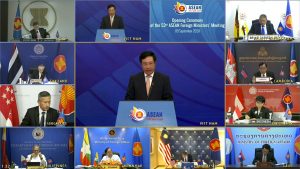The coronavirus pandemic and disputes in the South China Sea have dominated discussions as Southeast Asian foreign ministers opened a four-day string of regional summits in Hanoi.
The annual meeting of the foreign ministers from the Association of Southeast Asian Nations (ASEAN) took place by video-link, minus the customary group handshakes and sunny photo-ops that have traditionally punctuated ASEAN events.
Recovery from the COVID-19 pandemic dominated the day’s talks, as underlined in the joint communique issued at the close of the annual meeting. According to a draft of the communique obtained by the press, the 10 foreign ministers called for “enhanced collaboration and sharing of experience with ASEAN’s partners in research, development, production and distribution of vaccines, providing access to medicines for COVID-19 and other diseases in future public health emergencies, and making them available and affordable to all as global public goods.”
The joint statement also noted that members encouraged “the maintenance of necessary interconnectedness in the region” by facilitating a resumption in the crossborder movement of people.
The ASEAN foreign ministers’ meeting kicks off a four-day series of virtual ministerial meetings of ASEAN and key partners including China and the United States.
The meetings take place against a backdrop of heightening tensions between the two superpowers, which have only increased since the onset of the COVID-19 pandemic. Tensions have focused on Chinese actions in the South China Sea, where Beijing has flexed its muscles in defensive of expansive maritime claims that impinge upon seas claimed by four Southeast Asian nations, as well as Taiwan. “The regional geopolitical and geoeconomic landscape, including the South China Sea, are witnessing growing volatilities that are detrimental to peace and stability,” Vietnamese Prime Minister Nguyen Xuan Phuc said in a speech a sparsely-attended opening ceremony.
According to the draft communique, when the South China Sea dispute was discussed during the meeting, “concerns were expressed by some ministers on the land reclamations, activities and serious incidents in the area which have eroded trust and confidence, increased tensions and may undermine peace, security and stability in the region.”
In recent months, the U.S. has stepped up its challenge to China’s expansive claims over the vital waterway. In July, Pompeo announced a policy shift clarifying that Washington regards virtually all of China’s maritime claims outside of its internationally recognized waters as illegal.
China has since accused the U.S. of sowing discord in the region, and pushed for the resumption of negotiations on a code of conduct aimed at preventing armed clashes between China and Southeast Asian claimants. To reflect Beijing’s more amenable position, Defense Minister Wei Fenghe embarked on a pre-summit tour of maritime Southeast Asia, with stops in Kuala Lumpur and Jakarta, followed by planned visits to Brunei and the Philippines. On September 7, Wei told Malaysian Prime Minister Muhyiddin Yassin that China was willing to work with ASEAN nations, including Malaysia, “to meet each other halfway.”
Senior U.S. officials including Pompeo have also recently criticized China’s damming of the upper Mekong, which recent research has linked to the record drought downstream. On September 11, Pompeo will join leaders from the lower Mekong countries in launching a new Mekong-U.S. Partnership, designed to push back against the growing Chinese influence in mainland Southeast Asia. For its own part, China recently offered to share hydrological data with downstream nations.
Geopolitical tensions are expected to dominate the week’s meetings, which culminate with the holding of the ASEAN Regional Forum, the region’s largest security meeting, on September 12. Throughout, the ASEAN states are likely to tread a careful line, seeking to balance their security ties to the U.S. and their economic ties with China, the latter of which may prove vital to the region’s post-COVID-19 recovery.
As Indonesian Foreign Minister Retno Marsudi told Reuters ahead of today’s meeting, “We don’t want to get trapped by this rivalry.”

































